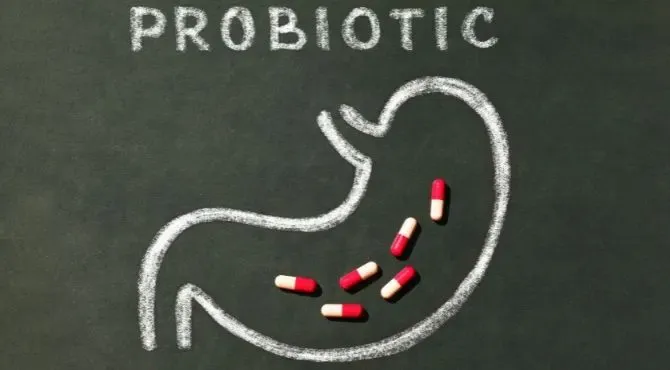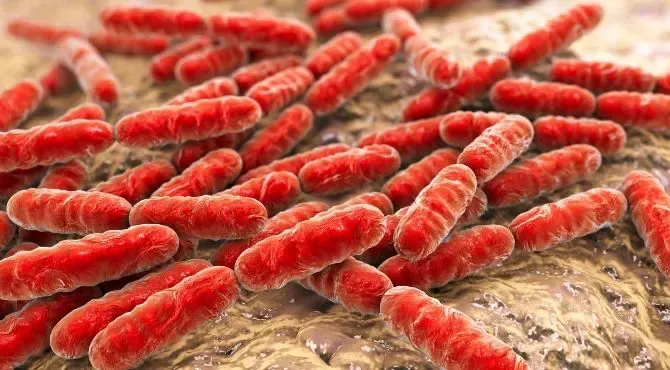What are probiotics?

What Are Probiotics? Types, Benefits And More
Probiotics are a group of microorganisms made up of bacteria, yeasts
and fungi.
They constitute the different microbiota of the human body, such as the cutaneous, oral or even intestinal microbiota. They feed on prebiotics, a type of fibre they are often confused with.
Thus, they improve the immunity of cells within the microbiota. In addition, they reinforce the barrier function of the mucous membranes and fight against microbial attacks.
This explains, among other things, their benefits on acne and skin diseases.
Probiotics also have beneficial effects on the intestinal microbiota. In particular, they help relieve constipation, which results in difficulty in passing stools.
For this, they enrich the microbial flora and promote stool transit in the colon. At the same time, they improve the associated symptoms and discomforts: bloating, stomach aches, flatulence, etc.
Thus, probiotic taking would be interesting if you suffer from transient or chronic constipation.
You can find it in yogurt, brewer's yeast, and fermented drinks like kefir or kombucha. They can also consume in the form of food supplements.

They constitute the different microbiota of the human body, such as the cutaneous, oral or even intestinal microbiota. They feed on prebiotics, a type of fibre they are often confused with.
Thus, they improve the immunity of cells within the microbiota. In addition, they reinforce the barrier function of the mucous membranes and fight against microbial attacks.
This explains, among other things, their benefits on acne and skin diseases.
Probiotics also have beneficial effects on the intestinal microbiota. In particular, they help relieve constipation, which results in difficulty in passing stools.
For this, they enrich the microbial flora and promote stool transit in the colon. At the same time, they improve the associated symptoms and discomforts: bloating, stomach aches, flatulence, etc.
Thus, probiotic taking would be interesting if you suffer from transient or chronic constipation.
You can find it in yogurt, brewer's yeast, and fermented drinks like kefir or kombucha. They can also consume in the form of food supplements.
What are probiotics benefits?

Beneficial bacteria and fungi
The term "probiotics" includes a set of living microorganisms composed of bacteria and fungi. In general, we distinguish:- Lactic acid bacteria: including lactococci, lactobacilli and leuconostoci. They are found in dairy products and fermented drinks such as kefir.
- Streptococci: including the bacterium Streptococcus thermophilus, used for making yoghurt;
- Saccharomyces: including Saccharomyces boulardii, a yeast belonging to the mushroom family.
Non-pathogenic probiotics are present in the different microbiota of
the body and develop in specific environments: skin, mouth, vagina, and
intestines.
The intestinal microbiota is one of the richest: it contains no less than 2 kg of microorganisms and more than 100,000 billion bacteria!
To grow, probiotics feed on prebiotics, a type of dietary fibre found in certain foods.
On the one hand, probiotics exert a stimulating action and strengthen immunity. Thus, they promote the production and release of B and T lymphocytes, the natural "killer cells".
They also support the immune system of the mucous membranes, including the intestinal, pulmonary and urogenital mucous membranes.
On the other hand, probiotics are protective microorganisms, and they fight against pathogenic bacteria, prevent them from settling and inhibit their activity. As this study shows, lactobacilli and Bifidus make it possible, for example, to eliminate the pathogenic bacterium Helicobacter pylori.
Thus, probiotics prevent many infections such as peptic ulcers.

The selected probiotics are natural, and the product is guaranteed without chemical additives and GMOs by organic farming specifications.
Be careful, however, to check the composition of food supplements because they often contain chemical excipients.
We also recommend specialized laboratories, such as Nutrimea and Nutri&Co, which have the expertise and offer quality probiotics.
NB: In France, unlike other countries such as Spain, manufacturers are not authorized to use the term "probiotic" or to make health claims.

They protect probiotics from stomach acid and dissolve quickly to deliver live bacteria to the gut.
The majority of the strains present are then destroyed before they even reach the intestine.
These formats are fascinating to take for a cure of a few days. But, as with tablets, they do not effectively protect living bacteria.
The intestinal microbiota is one of the richest: it contains no less than 2 kg of microorganisms and more than 100,000 billion bacteria!
To grow, probiotics feed on prebiotics, a type of dietary fibre found in certain foods.
Strengthen and protect the body
Probiotics have benefits both on the environment in which they develop and on the whole body: skin, immune system, transit and digestion, and nervous system.On the one hand, probiotics exert a stimulating action and strengthen immunity. Thus, they promote the production and release of B and T lymphocytes, the natural "killer cells".
They also support the immune system of the mucous membranes, including the intestinal, pulmonary and urogenital mucous membranes.
On the other hand, probiotics are protective microorganisms, and they fight against pathogenic bacteria, prevent them from settling and inhibit their activity. As this study shows, lactobacilli and Bifidus make it possible, for example, to eliminate the pathogenic bacterium Helicobacter pylori.
Thus, probiotics prevent many infections such as peptic ulcers.
Where to buy probiotics?

Organic stores
Many organic stores, such as Naturalia or La Vie Claire, offer probiotics in the form of food supplements. These are most often capsules, tablets, or sachets to be diluted.The selected probiotics are natural, and the product is guaranteed without chemical additives and GMOs by organic farming specifications.
Pharmacies and parapharmacies
Pharmacies and para pharmacies generally offer a wide choice of probiotics. These may be microorganisms alone or a probiotic/prebiotic combination.Be careful, however, to check the composition of food supplements because they often contain chemical excipients.
Specialized physical shops
It is also possible to find probiotics in specialized "wellness" shops and boutiques. Give preference to sellers of food supplements, dietary products and/or sports nutrition.Specialized e-commerce
If you want to buy probiotics on the Internet, turn to online organic stores, such as Kazidomi or La Fourche, and food supplement retailers.We also recommend specialized laboratories, such as Nutrimea and Nutri&Co, which have the expertise and offer quality probiotics.
NB: In France, unlike other countries such as Spain, manufacturers are not authorized to use the term "probiotic" or to make health claims.
In what form?

In capsules
Probiotic capsules are convenient, easy to take and tasteless. If you opt for this format, check that they are "enteric-coated" capsules.They protect probiotics from stomach acid and dissolve quickly to deliver live bacteria to the gut.
In tablets
We do not recommend this format, which is not very effective. Indeed, probiotics are often denatured and are not protected against gastric acidity.The majority of the strains present are then destroyed before they even reach the intestine.
In powder
Powdered probiotics come in the form of sachets to be diluted in water. There are also sticks whose content is poured directly into the mouth and dissolves instantly.These formats are fascinating to take for a cure of a few days. But, as with tablets, they do not effectively protect living bacteria.
What criteria should be considered when buying probiotics?

1. Selected strains
Probiotics are made up of different strains that each have specific properties.- Lactobacillus gasseri is effective against pathogenic bacteria and aids in weight loss.
- Bifidobacterium lactis, on the other hand, contributes to the proper functioning of the digestive system and promotes immunity.
- Lactobacillus acidophilus is indicated to relieve intestinal inflammation.
Each health problem, therefore, corresponds to a strain of bacteria.
In the ingredient list, each probiotic is presented with its genus, species, and strain name ( Bifidobacterium lactis – SD-5859, for example).
2. Number of stumps
The number of strains is also an important criterion. The active bacteria content is expressed in millions/billions or CFU/g units (Colony Forming Unit per gram). The more bacteria, the better for shelf life.We recommend a food supplement containing at least 10 billion bacteria.
3. Manufacturing method
To be fully effective, probiotics must have good gastro-resistance. Once ingested, the bacteria must be able to survive stomach acid, digestive juices and bile salts before reaching the colon and intestines.The manufacturing method must guarantee you this gastro-resistance.
Specific methods also make it possible to improve the ability of bacteria to adhere to the intestinal mucosa. They then "mix" with your microbiota and interact better with the present bacteria.
4. Composition
We advise you to choose a natural food supplement without dyes, flavour enhancers, preservatives and synthetic sweeteners.There are also lactose-free and gluten-free probiotics for intolerant people.
5. Price
For probiotics in capsules and with "enteric coated" tablets, it is necessary to count between 20 and 30€ for 60 pills.On the other hand, probiotics in tablets are offered between 10 and 15€ for 30 tablets.
Finally, the selling price for probiotics in powder or stick form is around €25.
What are probiotics in food
You can also find probiotics in certain foods. They are mainly present in fermented foods such as yogurts, brewer's yeast or kefir.Yogurt
Yogurt comes from a fermentation during which lactic acid bacteria transform the milk. It most often contains strains of lactobacillus bulgaricus, streptococcus thermophilus and bifidobacteria.Probiotics are also found in whey ("whey"), raw milk cheeses and buttermilk (curds).
Soy yogurts, made from fermented soy milk, also contain good bacteria.
Beer yeast
It is composed of microorganisms and strains of fungi such as Saccharomyces cerevisiae.It is interesting in case of intestinal pain or to relieve irritable bowel syndrome.
Be careful to choose active or "revivable" brewer's yeast, simply dehydrated. Indeed, the inactive brewer's yeast is heated to a high temperature, and it then loses its probiotic qualities.
It can consume in capsules, powder or flakes sprinkled on your dishes.
Fermented drinks
Both kefir and kombucha are fermented drinks made from a yeast culture. They are full of beneficial microorganisms.They contain lactobacilli , lactococci, leuconostocci as well as bacteria of the genus Acinetobacter and Gluconobacter. They relieve digestive disorders and facilitate digestion.
Fermented cabbage
Fermented cabbage (white or red) is obtained through "Lacto-fermentation ". It is left to ferment for several days in a mixture of water and salt.During the process, it becomes loaded with lactic acid bacteria.
It can be prepared as sauerkraut or kimchi, a traditional Korean dish made from Lacto-fermented vegetables.
Miso
A traditional Japanese food, miso is a paste made from soybeans, rice and/or barley. These ingredients ferment for several months in a mixture of water, salt and ferment called "koji".Miso paste contains, in particular, lactobacilli and a strain of Aspergillus oryzae fungus.
It can replace salt in daily cooking and can be used to concoct soups, broths and risottos.
What are probiotics good for
To be sure you are choosing quality probiotics, check:
Selected strains: choose your food supplement according to the properties of
the strains and your needs;
The number of strains: always check the CFU and choose a supplement
containing at least 15 billion bacteria;
The manufacturing method: the gastro-resistance of the bacteria and their
ability to adhere to the intestinal mucosa is essential elements;
The composition: choose a natural product without chemical additives and
preservatives (and possibly without lactose and gluten);
The price should be between 20 and 30€ for 60 capsules and around 15€ for
tablets. Probiotics in powder or sticks sell for about €25.
Read More:
Post a Comment